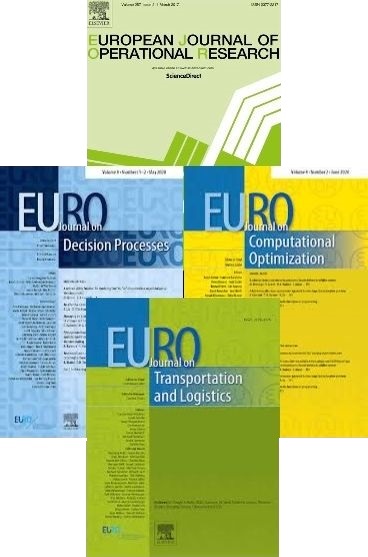EURO Journal on Transportation and Logistics
Call for Papers
Special Issue: Data-Driven Optimization for Transport and Logistics Systems
This Special Issue aims to invite researchers who can offer novel data-driven efficient algorithms covering a range of methods (optimization, simulation, data-driven heuristics and data analytics) to tackle complex transport and logistics problems. We encourage the participation of researchers proposing new applications and methods to design efficient algorithms for real-world transportation and logistics problems.
Guest editors:
- Dr. Shadi Sharif Azadeh, TU Delft, Civil Engineering and Geosciences, Department Transport & Planning, Stevinweg 1, 2628 CN Delft, The Netherlands. Email: s.sharifazadeh@tudelft.nl
- Dr. Nursen Aydin, Warwick Business School, The University of Warwick, Coventry, CV4 7AL, UK. Email: nursen.aydin@wbs.ac.uk
- Deadline for submission: March 1, 2022
Aim and Scope
Transport and logistics systems include a range of activities that deal with all sorts of decisions and operations from vehicle routing and scheduling to distribution of passengers and products in different regions. One of the main challenges for transport operators is to deal with large-scale and complex problems at minimal cost while satisfying the needs of service users.
Operators aim at solving these complex problems in a computationally efficient way. In recent years, with the increase of demand, this task has become more challenging. However, with increasingly diverse sets of operational data becoming available in transportation and logistics systems, incorporating advanced technologies is promising to pave the path for improving the already existing models. Like traffic management, data-driven optimization methods have found their way in the field of transport and logistics. Therefore, there is an increasing need to introduce computationally efficient algorithms that are motivated by available real-world data to solve these traditional problems.
This Special Issue aims to invite researchers who can offer novel data-driven efficient algorithms covering a range of methods (optimization, simulation, data-driven heuristics and data analytics) to tackle complex transport and logistics problems. We encourage the participation of researchers proposing new applications and methods to design efficient algorithms for real-world transportation and logistics problems.
Potential topics include but not limited to:
- Data-driven heuristic methods for transport and logistics
- Incorporating emerging technologies in large-scale optimization problems
- Real-time operations for large scale problems
- New transport and logistics applications and models for integrating optimization with data analytics
Important Dates
Submission deadline: 1 March 2022
Notification of the first-round review (for guidance only): 1 July 2022
Revised submission due (for guidance only): 1 September 2022
Final notice of acceptance/reject (for guidance only): 1 December 2022
Papers will be subject to a review process managed by the Guest Editors. The primary acceptance criteria for submission are the quality and originality of the research, the paper's analytical contributions, and the relevance of the research topic.
Early submission is encouraged. The referee process will start upon submission of the paper. Accepted papers will be published individually online as they are accepted, before print publication. All inquiries concerning the submission to the special issue will be addressed directly by the Guest Editors.
Manuscript submission information:
The deadline for submissions is 1 March 2022. All articles submitted in this journal will be 100% (APC) waived until December 31, 2022 and APC will be covered by EURO.
Submitted papers should be original and should have not been previously published or currently considered for publication elsewhere. The manuscript should be prepared according to the Guide for Authors available at:https://www.elsevier.com/journals/euro-journal-on-transportation-and-logistics/2192-4376/guide-for-authors
All manuscripts should be submitted electronically using the journal's online manuscript submission system at: https://www.editorialmanager.com/jtl/default.aspx
When prompted for the article type, please select "SI: Large-Scale Optimization”.
On the Attach Files screen, please submit the Manuscript, Highlights, Cover Letter summarizing the contributions of the paper, and Conflict of Interest Declaration. Template available at:
https://service.elsevier.com/app/answers/detail/a_id/286/supporthub/publishing/
Keywords:
Large data, heuristics, algorithms, large scale optimization
Why publish in this Special Issue?
- Special Issue articles are published together on ScienceDirect, making it incredibly easy for other researchers to discover your work.
- Special content articles are downloaded on ScienceDirect twice as often within the first 24 months than articles published in regular issues.
- Special content articles attract 20% more citations in the first 24 months than articles published in regular issues.
- All articles in this special issue will be reviewed by no fewer than two independent experts to ensure the quality, originality and novelty of the work published.
Learn more about the benefits of publishing in a special issue: https://www.elsevier.com/authors/submit-your-paper/special-issues
Interested in becoming a guest editor? Discover the benefits of guest editing a special issue and the valuable contribution that you can make to your field: https://www.elsevier.com/editors/role-of-an-editor/guest-editors

This work is licensed under a Creative Commons Attribution-ShareAlike 3.0 International License and the GNU Free Documentation License (unversioned, with no invariant sections, front-cover texts, or back-cover texts).
